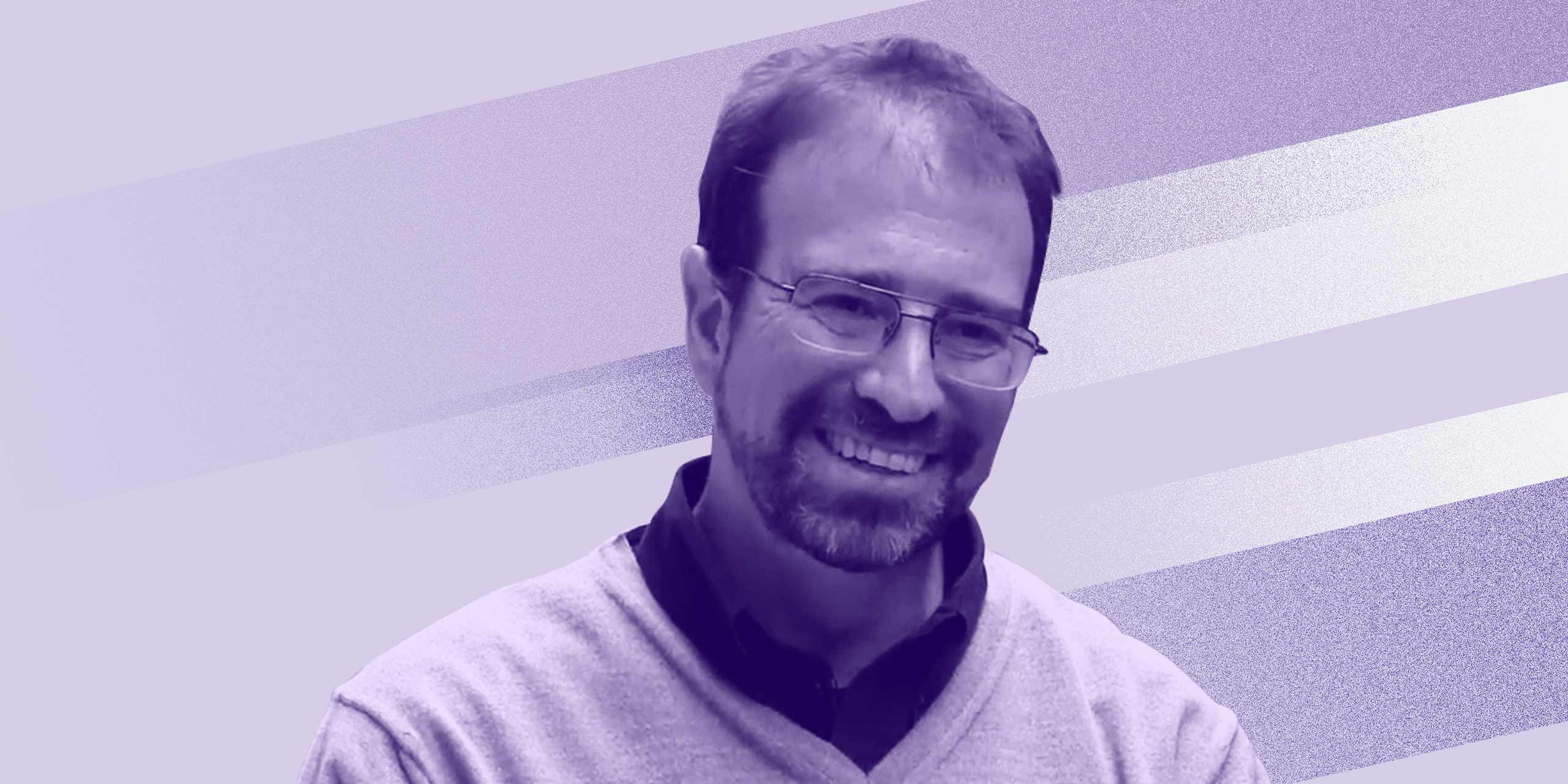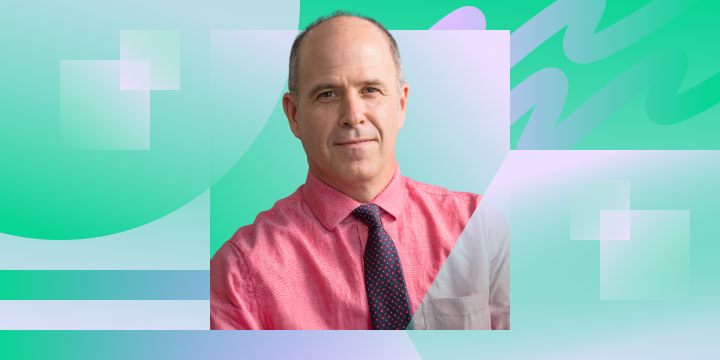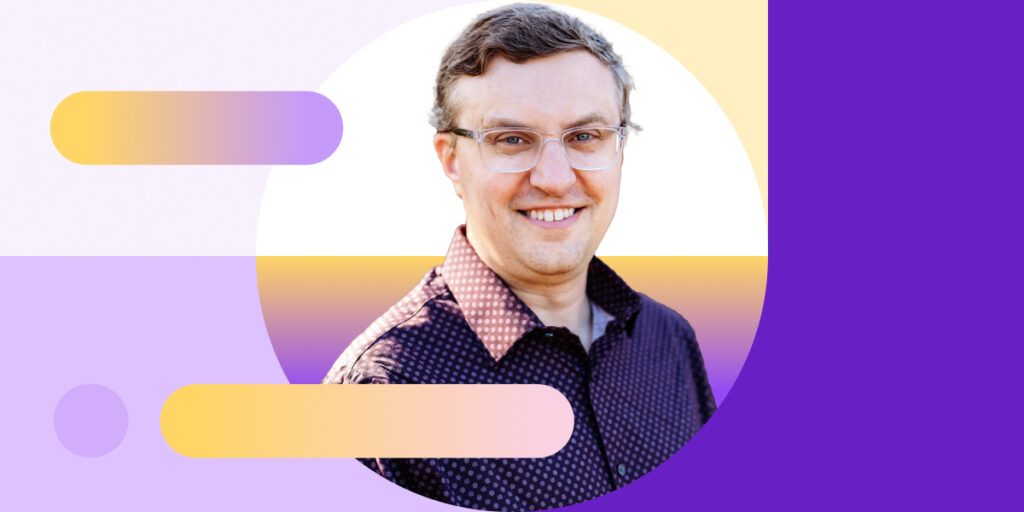In our recurring series “Academic Admissions” we ask interesting people to tell us about the transformative role education has played in their lives. In this instalment, Howard Burton explains what happened after an inspirational physics professor gave him an appreciation for the beauty and utility of math, when his first choice—in sports—became improbable.
Howard Burton is creator and founder of the Ideas Roadshow, a comprehensive database of research and public-facing talks and literature designed to help researchers and academics communicate their life’s work in a way that is more substantial than a journalistic soundbite—but more accessible than a paywalled academic journal. Burton also founded the Perimeter Institute, a leading center for scientific research, training and educational outreach in foundational theoretical physics, in Waterloo, Ontario, Canada.
Ideas Roadshow is available on the Top Hat Catalog — find out more here.
I grew up in Toronto in an area that was pretty ‘traditional,’ for lack of a better word. People got traditional jobs, had two kids. They had the whole white picket fence thing going on. That was normal to me. As a kid, I went to public schools, but I didn’t really study hard. I kind of coasted through. It’s not that I wasn’t interested. It was more that my world was laser-focused on tennis. I loved to play and I did it competitively for years.
When it came time to go to university, I chose Western University—but not for academics—they had a really good tennis academy in London (Ontario), so that was my main reason for going. I spent a year at Western doing general courses while I played. But it became obvious during that year that I wasn’t going to make a career out of tennis. And that changed everything. My main reason for being in London wasn’t there anymore.
I ended up transferring to the University of Toronto, where I completed a double major in physics and philosophy, and then a Master’s in philosophy. During my Master’s degree, I found that while the people I was around liked to ask deep questions, they didn’t necessarily have the tools to answer them properly. They were lacking that mathematical rigor. That’s when I thought, I’ll go back more to the physics side of things and delve into a little bit more hardcore math stuff.
So, after being a slacker, I started paying a little bit more attention to fundamental mathematics. I moved to London, England to do a Master’s degree in theoretical physics at Imperial College. That was an eye-opening experience because it made me understand how little I knew. There were a couple of courses that were taught by a fellow by the name of Chris Isham, who’s quite a famous theoretical physicist—he’s a very deep thinker.
Through those courses, I realized that there were a lot of things that were incredibly beautiful that had to do with mathematics. Up until then, I’d bought the standard physics line of: Mathematics is just a tool, it’s basically a glorified calculator. But it was through Chris and these courses that I got a very strong sense that there was some real beauty and depth and that you couldn’t really understand anything deeply in physics unless you have a deep appreciation of the mathematics.
I also met my future wife during my time in London. She’s Dutch so we moved to the Netherlands for a few years. Then we moved back to Canada and I wound up doing a PhD at the University of Waterloo.
My motivation for doing a PhD was based on my experiences at Imperial. I wanted to develop a deeper understanding of physics and math. By conventional standards, I started it pretty late. I think I was 28. The way the game works, well, it’s very hard to get an academic position in this discipline. And the few positions that do exist are given to super hotshots that get their PhD at the age of seven or something, from Princeton.
It was clear to me that unless I somehow did some Nobel Prize-winning work, which was hugely unlikely, an academic career wasn’t in my future. And that was quite liberating. It meant I could take four years, indulge myself and try to learn as much as I could about these things that were fascinating me.
From Wall Street to Waterloo
As I was finishing up my PhD, I started to think about jobs. A standard avenue that people with a mathematical science background took in the real world is in mathematical finance. This was in the late 90s and that was an obvious route to go. It wasn’t something that I wanted to do at all. But one has to eat and it seemed like an obvious thing to do. I started hustling around and eventually accepted a position on Wall Street.
About six weeks or so before I was due to start, I had one of these “Is this really what I want to do with my life?” moments. And the answer was a resolute “absolutely not.”
I started to think about what else I could do. I thought to myself, “Well, I’ve got these other skills and degrees. Maybe I can get a job in the real world in some other capacity.” I wrote to a bunch of CEOs directly and said “I’m a smart guy and I’m interested in working for your company.”
One of those companies was in Canada. It was a new company I’d never heard of and at the time it was called Research in Motion (now called BlackBerry). I wrote a letter, an actual letter, and after a few weeks I got a response from a guy saying “You can always work here but there’s another project I’ve been thinking about—can we talk?”
This was 1999. The guy who wrote back was Mike Lazaridis. He was one of three founders of RIM and an engineering guy. His company had recently gone public which meant he had a lot of money. He wanted to turn his attention to large scale personal philanthropy. He didn’t know exactly what he wanted to do but he’d always had this idealistic love of physics. He was excited at the possibility of using his newfound financial wealth to do something interesting and innovative in a philanthropic way in the sciences. And that’s where this idea for the Perimeter Institute came from.
The Perimeter Institute: Doing things differently

It was funny. After I graduated, I never expected to be in the physics world—but all of a sudden, not only was I in it, I was at the highest level, rubbing shoulders with the likes of Nobel Laureates.
My job was basically to build this research institute from the ground up. And it was a great learning experience. Very few people have the opportunity to do something like that. It was a fun experience in so many ways. We started from zero. I had to recruit people, build an advisory committee, get a building constructed, negotiate contracts. I had to craft the research component and in addition to that, we came up with a very strong outreach program. I also had to lobby for government funding. Which sounds strange, right? Mike had enough money to run this thing for five or ten years. But the thing is that academics want to know it’s going to be around for the long haul. They want to know it’s not going to go bust after five years. So that was where the government funding piece came in.
Trying to get the government interested in supporting this was like trying to climb a mountain. But we kind of had to because we were trying to hire people and establish credibility at a time when Canada wasn’t considered a major player in theoretical physics. Having government backing would help with that. In the end, it worked out quite well, but it certainly took some time.
There was also the research agenda that needed to be developed. My idea right from the beginning was, there are institutes all over the world: how can we make an institute which does things a little bit differently? Why don’t we try tackling some of the interesting sociological questions that need to be tackled for any institute? And I realize too what a privilege that was.
I recalled being in graduate school and getting together with friends. We’d sit in donut shops at two in the morning and say “If I ran the world, I’d do it this way.” Then all of a sudden, through a curious quirk of fate, I actually had a chance to run the world. So I thought all right, well, why don’t we do that?
The really interesting stuff for me is at the beginning, when you’re creating something.
I was at the Perimeter Institute for eight years. We began in 1999 and I left in 2007. It was a great ride. I could have stayed a lot longer. But the really interesting stuff for me is at the beginning, when you’re creating something and we were creating things left, right, center and sideways.
I felt our most significant accomplishment during that time was building a very strong outreach program for the general public, but programs for teachers and for high school and university students. Doing that was interesting to me because it really gave me a clear sense of the hunger that exists at all levels for scientific knowledge. I’d hear from university presidents, researchers, provosts and academics. And they were all doing these great things but the common issue they all had was that they claimed no one knew about them.
Building a bridge between research and the public
I had this moment of recognition that a forum didn’t exist for these people to talk honestly and candidly about the research they did. Most of the time, what happens is they’ll win an award and a journalist will be asking them to define their life’s work in five seconds or something like that. They don’t have the opportunity to critically engage in a leisurely, enjoyable way and describe, warts and all, the research, the mistakes they’ve made, the successes they’ve had, what excites them, what gets them out of bed in the morning, what they’re frustrated by, what they’re losing sleep over. And these are the things that the public actually really cares about.
I thought, I can actually harness the power of technology and do that. I can create the bridge between all these fascinating researchers and the general public. That was the motivation behind creating Ideas Roadshow. And that became my project once I’d left the Perimeter Institute.
With Ideas Roadshow, we’re offering a large collection of original, high-quality video resources, e-books and podcasts in a range of subjects. All the resources have been created with an aim to inspire lifelong learners, students, and teachers, giving them an accessible glimpse into the world of top-level research. We’ve got some top flight researchers and experts: Dr. Carol Dweck, who talks about mindset. We have Oxford University mathematician Roger Penrose who talks about the cyclic universe. Really the idea is to keep adding to this portal of information and sharing this knowledge with the world.
Originally, we had geared our resources towards the academic market and then had a separate stream for the general public. But I long thought that where this would have the most impact is actually at the high school level.
I wasn’t sure what to do about that or what the best place would be for that. Then I stumbled on the International Baccalaureate program, I thought okay, this is actually the thing that we can do and we can do it for a variety of reasons. First of all, because these guys have already done the heavy lifting, they have a very strong curriculum, which is completely international. When I started looking at what they’d done, it’s really remarkable. So many people have tried to do things in education, but the people behind the IB program succeeded in many, many ways. The standards are incredibly high, they have a clear system where they ensure that the teachers go through. It was the perfect fit for our content. I had to go back to the source material and recut and reshape it a different way. But it’s done now and I’m really excited to be focusing on that particular direction now.
We’ve had some success with Ideas Roadshow. We were the featured resource for Harvard Library for a month last year and we won an international excellence award last spring at the 2018 London Book Fair. But recognition isn’t my motivating factor. I’ve never been somebody who’s terribly concerned about what other people think.
When my time isn’t taken up by Ideas Roadshow, I like to read. I still love mathematics and ideas. That desire for learning never really left me. I think that’s what’s been so great about my career. I never really thought of what I do as my career. It’s just my life.
Ideas Roadshow in your course
Did you know you can incorporate Ideas Roadshow into your course material? Get exclusive videos and candid insights on the relevance, impact, and excitement of cognitive science from Carol Dweck, Philip Zimbardo, Barbara Fredrickson and many others. Find out what’s on offer on the Top Hat Catalog.


